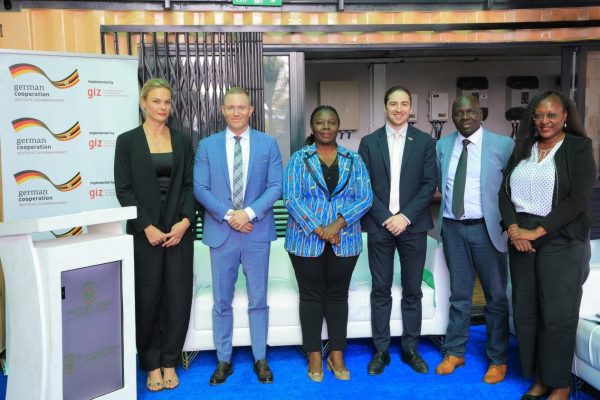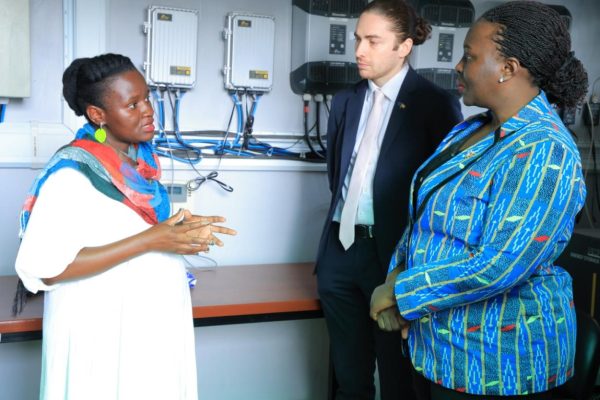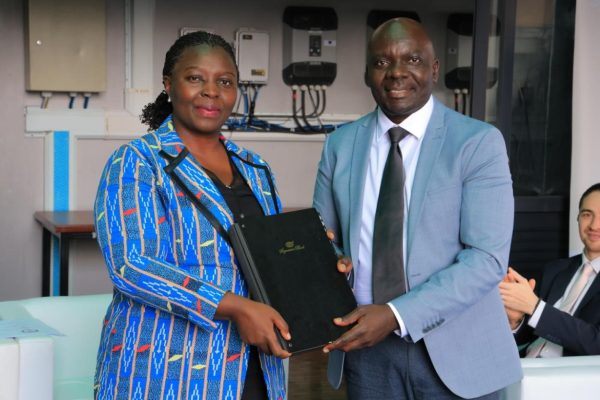On 18th July 2025, the Renewable Energy Training Centre (RETC) was officially handed over from GIZ to the Ministry of Energy and Mineral Development. Established in 2016 through a partnership between GIZ Uganda, Nakawa Vocational Training College, and the Cologne Chamber of Skilled Crafts and Small Businesses (HWK), the centre was developed with both financial and technical support from the German government and the European Union.
Equipped with state-of-the-art technologies, the RETC has played a critical role in delivering hands-on training in solar home systems, mini-grids, and hybrid energy solutions. Its programmes provide industry-certified skills that enable graduates to meet the immediate demands of Uganda’s clean energy sector, addressing the pressing need for skilled labour in the energy transition.

Ms. Prossy Nambajjwe, custodian of the Renewable Energy Training Centre (RETC), led delegates from the European Union, the German government, and Uganda’s Ministry of Energy and Mineral Development on a guided tour of the facility. Delegates were shown the office space, training rooms, and a range of state-of-the-art equipment available at the centre. She also provided insights into the centre’s operations, including the number of trainees accommodated per session, the growing demand for its services, and other key elements of its training programmes.
Mr. David Otieno, Head of the Energy and Climate Programme at GIZ Uganda, shared that over 1,000 students, 60% of whom were female, had been trained in e-mobility and solar technologies at the centre. He emphasized that this training addresses the sector’s skills gap while promoting gender inclusion in the renewable energy workforce.
Mr. Philippe Roussel, Deputy Head of the German Development Cooperation, reaffirmed the German government’s commitment to supporting Uganda’s clean energy agenda through increased renewable energy generation, access, and efficient energy use. He highlighted RETC’s role in laying the groundwork for innovation and job creation, contributing to Uganda’s sustainable development goals. He noted that Germany has supported Uganda for over 60 years in areas essential to economic growth and well-being, including energy, vocational training, and private sector development. He thanked GIZ for spearheading implementation, acknowledged the Ministry of Energy and Mineral Development as a key partner in the energy space, and appreciated the EU’s continued collaboration. He described the handover ceremony as a milestone in Uganda’s energy transition and skills development, reflecting a commitment to increasing access to clean, reliable, and affordable energy as outlined in NDP IV and Vision 2040.
Mr. Sofian Dahmani, Programme Officer with the European Union, stated that Team Europe has been a long-standing partner in Uganda’s energy sector, supporting national priorities such as unlocking investment, expanding electricity access, growing renewable energy capacity, and integrating regional energy markets. He described the handover as a strong symbol of effective collaboration between national leadership, international support, and community engagement, and reaffirmed the EU’s continued commitment to Uganda’s energy transition.
Mr. Adiru John Steven, a graduate of the RETC and representative from Uganda Technical College, Lira, commended the Promoting Renewable Energy and Energy Efficiency Programme (PREEEP) for training over 50 youth from Lira in solar technologies. He noted that this has equipped the Lango and Acholi regions with both administrative and technical capacity, eliminating the need for external technicians.
The Permanent Secretary at the Ministry of Energy and Mineral Development, Eng. Irene Pauline Bateebe, thanked partners from the European Union, GIZ, the Federal Republic of Germany, and Nakawa Vocational Training College. She explained that the establishment of the RETC was inspired by the need to expand Uganda’s training landscape beyond basic solar home systems to include advanced technologies for rural electrification, energy efficiency, and productive energy use. While the centre’s central location was chosen for accessibility to stakeholders in Kampala, she committed to working with other technical colleges to extend reach to additional regions, inspired by Mr. Adiru’s testimony from Lira.
Eng. Bateebe outlined the vision for the partnership between the Ministry of Energy and Mineral Development, Ministry of Education and Sports, and Nakawa Vocational Training College going forward. This includes:
- Sustaining centre operations through a viable long-term business model already in place
- Enhancing visibility and awareness of the centre as a national training hub
- Fostering innovation through experimentation, partnerships, and the adoption of cutting-edge solutions
- Strengthening collaboration across sectors and regions
She expressed the Ministry’s intention to develop the RETC into a hub that supports national priorities and advances the skills needed to meet the ambitious targets set out in Uganda’s energy policy.


The Permanent Secretary, Eng. Irene Pauline Bateebe, outlined key priorities to guide the next phase of the Renewable Energy Training Centre’s development. She tasked the Ministry of Energy and Mineral Development to:
- Develop a strategy to extend the RETC model beyond Nakawa Vocational Training Institute and enable other technical colleges across the country to benefit.
- Finalize and implement a sustainability plan to support the centre’s continued growth and long-term relevance.
- Integrate entrepreneurship training into the curriculum to equip graduates with skills to establish and run their own clean energy enterprises.
- Align the centre’s operations and programmes with the broader Technical and Vocational Education and Training (TVET) Reform Agenda.
These directives aim to strengthen the RETC’s position as a national centre of excellence and ensure its contribution to Uganda’s clean energy transition remains impactful and inclusive.


